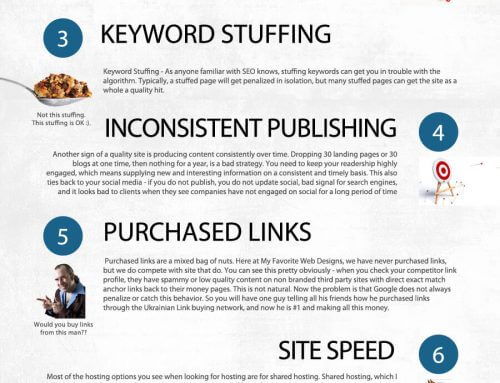Some Of Our Best New SEO Techniques From 2015
This is been a very interesting year for search engine optimization companies in Arizona. Many different changes in the way that Google’s algorithm ranks websites have continued to force the technology of optimizing for that algorithm to evolve. Google has continued to focus on structured data including microdata and JSON. These technologies allow web authors to mark up their content thereby clearly indicating which elements are connected to which other elements.
A good example of this is the markup that goes into images and logos, as well as mentions of company or brand name. There is specific schema markup that is recommended for use when these elements occur so that Google knows you are referencing the company being discussed, and does not confuse the brand name with merely a collection of words and sentence or the logo as simply another image on the page.

Other advancements have included optimizing websites for better user experience and mobile experience. Many of us in the Seo community knew that eventually Google would begin to reward well-designed websites, and 2015 marks the year that this has begun. Examples of how this works can be found in the mobile algorithm that was commonly referred to as mobilegeddon. Mobilegeddon was largely marketing on the part of Google, the intention behind it was to for site owners to upgrade their web presence and make it mobile friendly. And in that it was hugely successful. However the name was incredibly overblown as the algorithmic shift was in no way similar to an Armageddon, it simply penalize the sites which had not been designed for mobile or using flash. On the flipside almost any site that was serious about trying to rank prior to this algorithm, had already been optimized for mobile due to the dozens of indications over the past two years that Google is given that this is coming, and because mobile browsing accounts for most 50% of traffic, and not optimizing for that audience would be professional negligence.
With the rise of structured data has emerged the prevalence of websites that are designed to aggregate data for use in Google’s knowledge base. The knowledge base is probably the most relevant advancement in SEO technology in the past two years. One of the main reasons that structured data is now emphasized is so that elements in any website across the web can be correlated directly to items inside of Google’s knowledge base. This data is definitely reinforced by studies done by other SEO entities, such as the 2015 ranking factors study by MOZ or the SEO periodic table distributed by Search Engine Land.
Other things that we have seen devalued include many of the easier or more comment link building strategies, such as social bookmarking or exact match anchor text links. Last year exact match anchor text was penalized in the over optimization penalty, and a common solution was to do branded links with varied achor text. This year we find that context is more important than anchor text itself. For instance does my link to my Queen Creek SEO page exist in the page that does not mention Queen Creek anywhere else? Is it on a page that talks more about web design than it does about search engine optimization? Is the site that it appears on relevant to these topics? And as you can imagine for that reason niche directories have gained prevalence while general directories such as IYP sites have continued to take a hit.
There is more evidence that accompanies activities elsewhere on the web are influencing rankings on the main website. For instance we find that companies that have more reviews rank more easily than companies that never bothered getting reviews. Before in terms of search engine optimization for small businesses, reviews were important in promoting conversion. But now we find that reviews are part of a larger landscape that is taken in context when defining the authority of any given company.
If I had to giv a few recommendations to newer SEO’s or people that were trying to do it themselves without getting too technical, my advice would be this: focus on rich media such as audio and video. Work on custom graphics that are very unique. Make sure that your writing is taking into account the synonyms and vernacular surrounding your main keyword. Do more reverse engineering to find niche directories that are relevant to your specific industry and concentrate on creating good unique content for those properties rather than blasting a multitude of more generalized properties. Make sure your site is mobile friendly and loads fast.
Things we are looking at for the future include the SSL algorithm becoming more forceful and important, more adoption of schema, and more focus on social activity and review activity across the web. We are also paying attention to mobile app development as a ranking factor and of course content length and depth as a factor.





Leave A Comment
You must be logged in to post a comment.